|
Featured picture tools: |
These featured pictures, as scheduled below, appeared as the picture of the day (POTD) on the English Wikipedia's Main Page in February 2022. Individual sections for each day on this page can be linked to with the day number as the anchor name (e.g. [[Wikipedia:Picture of the day/February 2022#1]] for February 1).
You can add an automatically updating POTD template to your user page using {{Pic of the day}} (version with blurb) or {{POTD}} (version without blurb). For instructions on how to make custom POTD layouts, see Wikipedia:Picture of the day.Purge server cache
February 1

|
Valerie Thomas (born 1943) is an American scientist and inventor. She invented the illusion transmitter, for which she received a patent in 1980, and was responsible for developing digital image processing systems used in the early years of the Landsat program, a satellite-imagery program run by NASA and the United States Geological Survey. This photograph, taken in 1979, depicts Thomas standing next to a stack of early Landsat computer compatible tapes. Photograph credit: NASA; restored by Adam Cuerden
Recently featured:
|
February 2
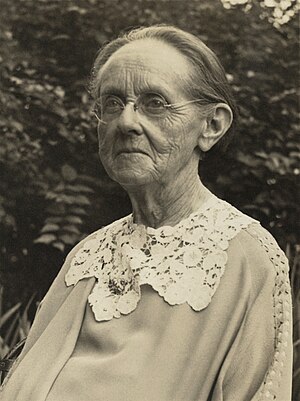
|
Alice Locke Park (February 2, 1861 – October 17, 1961) was an American suffragist and a defender of women's rights. She served as associate director of the Susan B. Anthony Memorial Committee of California. This photograph of Park, from the records of the National Woman's Party, was taken around the 1910s. Photograph credit: unknown; restored by Adam Cuerden
Recently featured:
|
February 3
|
The hooded robin (Melanodryas cucullata) is a small passerine bird native to Australia. Like many brightly coloured robins in the family Petroicidae, it is sexually dimorphic; the male bears a distinctive black-and-white plumage, while the female is a nondescript greyish-brown. These male (top) and female (bottom) hooded robins were photographed in Glen Davis, New South Wales. Photograph credit: John Harrison
Recently featured:
|
February 4
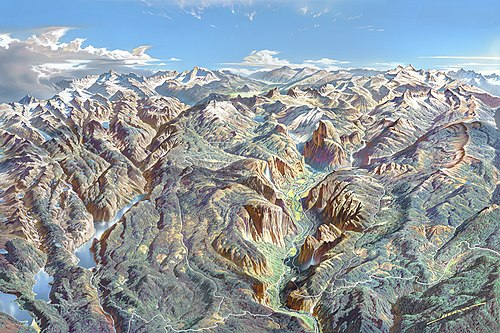
|
|
Heinrich C. Berann (1915–1999) was an Austrian painter and cartographer. He achieved world fame with his panoramic maps that combined modern cartography with classical painting. Towards the end of his life, he created panoramic posters of four national parks of the United States, produced for and published by the National Park Service. This panorama, painted by Berann in 1989, depicts Yosemite National Park in California, looking generally northeastward. In the center of the image is Yosemite Valley, surrounded by granite summits including El Capitan and Half Dome, as well as Yosemite Falls. The peaks of the Sierra Nevada are visible in the background. Painting credit: Heinrich C. Berann
Recently featured:
|
February 5
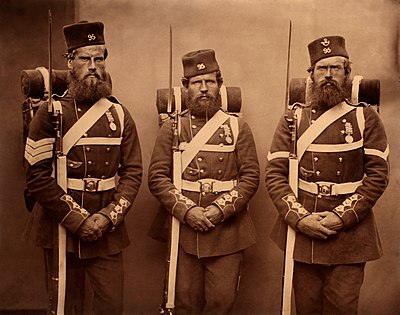
|
The 95th (Derbyshire) Regiment of Foot was a British Army infantry regiment raised in 1823. This carbon print of a photograph taken in 1856 depicts three members of the 95th who fought in the Crimean War (1853–1856): Sergeant John Geary, Thomas Onslow, and Lance Corporal Patrick Carthay. The men are wearing the Crimea Medal on their uniforms. Photograph credit: Cornelius Jabez Hughes, after Joseph Cundall and Robert Howlett; restored by Adam Cuerden
Recently featured:
|
February 6
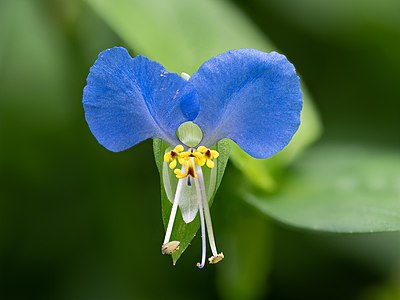
|
Commelina communis, the Asiatic dayflower, is an annual herbaceous plant in the dayflower family, Commelinaceae. The blooms last for a single day and are distinctive with two relatively large blue petals and one much reduced white petal. The three long stamens are fertile, while the three short stamens are infertile. This focus-stacked photograph of a C. communis flower was taken in a garden in Bamberg, Germany. Photograph credit: Reinhold Möller
Recently featured:
|
February 7

|
Trosia nigropunctigera, the rosy ermine moth, is a lepidopteran in the family Megalopygidae native to the Neotropics. The species is distributed across Costa Rica, Panama, Colombia, Venezuela, Guyana, Ecuador and Peru. This adult T. nigropunctigera moth was photographed in the Mount Totumas cloud forest in Panama. Photograph credit: Charles James Sharp
Recently featured:
|
February 8

|
|
Ignace-Gaston Pardies (1636–1673) was a French Catholic priest and scientist. His celestial atlas, entitled Globi coelestis in tabulas planas redacti descriptio, comprised six charts of the night sky and was first published in 1674. The atlas uses a gnomonic projection so that the plates make up a cube of the celestial sphere. The constellation figures are drawn from Uranometria, but were carefully reworked and adapted to a broader view of the sky. This is the third plate from a 1693 edition of Pardies's atlas, featuring constellations including Cancer, Gemini and Taurus, visible in the northern sky. Map credit: Ignace-Gaston Pardies
Recently featured:
|
February 9

|
|
Falstaff is a comic opera in three acts by the Italian composer Giuseppe Verdi. The Italian-language libretto was adapted by Arrigo Boito from the play The Merry Wives of Windsor and scenes from Henry IV, Part 1 and Part 2 by William Shakespeare. The work premiered on 9 February 1893 at La Scala in Milan. The last of Verdi's twenty-eight operas, the opera's plot revolves around the thwarted, sometimes farcical, efforts of the fat knight Sir John Falstaff to seduce two married women to gain access to their husbands' wealth. This photograph shows the Italian baritone Ambrogio Maestri playing the title role in a 2016 production of Falstaff at the Vienna State Opera. Photograph credit: Christian Michelides
Recently featured:
|
February 10

|
The Tales of Hoffmann is an opéra fantastique by the French composer Jacques Offenbach. The French libretto was written by Jules Barbier, based on three short stories by E. T. A. Hoffmann, the opera's protagonist. It was Offenbach's final work; he died in October 1880, four months before it premiered on 10 February 1881 at the Opéra-Comique in Paris. This illustration of the premiere, attributed to Pierre-Auguste Lamy, depicts the opera's prologue (or possibly epilogue). Illustration credit: Pierre-Auguste Lamy (attributed); restored by Adam Cuerden
Recently featured:
|
February 11
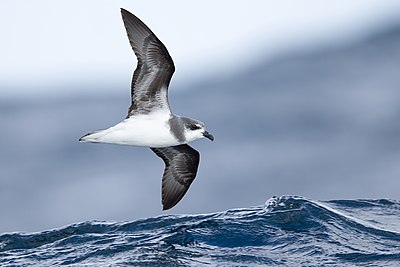
|
The soft-plumaged petrel (Pterodroma mollis) is a species of seabird in the family Procellariidae, found in the Southern Hemisphere. The species is known to breed on Tristan da Cunha, Gough Island, the Prince Edward Islands, the Crozet Islands, Macquarie Island and the Antipodes Islands of New Zealand. At other times of year, the petrel disperses more widely; this light-morph petrel was photographed at Eaglehawk Neck, east of the Tasman Peninsula in Tasmania, Australia. Photograph credit: John Harrison
Recently featured:
|
February 12
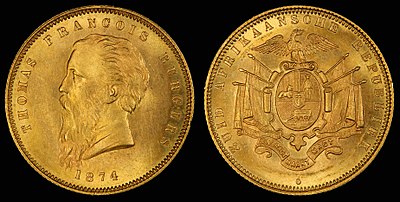
|
Thomas François Burgers (1834–1881) was the fourth president of the South African Republic (Transvaal) from 1872 to 1877. The first coins of the Transvaal Burgerspond were introduced by Burgers in 1874, responding to a demand for coinage from the populace dating back to 1853. Burgers sent a portrait of himself to his UK consul-general, who commissioned the coins to be struck at Heaton's Mint in Birmingham, England. Some people in the South African Republic objected to the issue of the Burgerspond because the portrayal of the president on coins was perceived to liken him to a dictator. This one-pound coin, minted in 1874, bears an effigy of Burgers on the obverse and the coat of arms of the Transvaal on the reverse. Coin design credit: Heaton's Mint; photographed by Andrew Shiva
Recently featured:
|
February 13

|
In American football, a field goal (worth three points) is scored when a team place kicks or drop kicks the ball through the goal, i.e. between the uprights and over the crossbar, during a play from scrimmage. This photograph depicts Connor Barth of the Tampa Bay Buccaneers preparing to kick a field goal, with Jake Schum acting as the holder, during a 2015 National Football League military-appreciation game against the New York Giants at Raymond James Stadium in Tampa, Florida. Photograph credit: Ned T. Johnston
Recently featured:
|
February 14
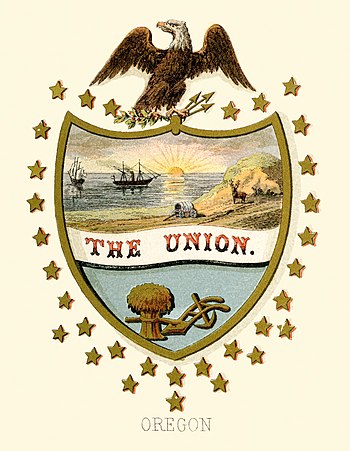
|
Historical coats of arms of the U.S. states date back to the admission of the first states to the Union. The historical coat of arms of Oregon shown here was illustrated by Henry Mitchell and published by Louis Prang in 1876 in The State Arms of the Union. Below the American eagle, the upper panel represents commerce, depicting mountains, an elk, a covered wagon, and the Pacific Ocean; in the ocean, a British man-of-war is departing and an American steamer is arriving, symbolizing the end of British rule in the Oregon Country. The lower panel shows a sheaf, a plow, and a pickaxe, symbolizing agriculture and mining. Illustration credit: Henry Mitchell; restored by Andrew Shiva
Recently featured:
|
February 15

|
Osteospermum is a genus of flowering plants in Calenduleae, one of the smaller tribes of the family Asteraceae, which includes sunflowers and daisies. The plants are also known as daisybushes and African daisies. The genus is closely related to the Chrysanthemoides. This photograph depicts a cultivar of Osteospermum known as 'Pink Whirls', which has flowers featuring spoon-shaped petals. Photograph credit: Jon Sullivan
Recently featured:
|
February 16

|
Gioachino Rossini (1792–1868) was an Italian composer best known for his thirty-nine operas. This 1821 lithograph by the French artist Paul Delaroche is entitled Il signor Tambourossini, which is a portmanteau of Rossini's name with tambour (French for 'drum'), caricaturing Rossini's European reputation at the time as a creator of noise. The illustration depicts "Tambourossini" in Oriental dress and playing a trumpet and a bass drum, accompanied by a screeching magpie, and assisted by King Midas, with ass's ears. Both are seen trampling on sheet music and violins, while Apollo, the god of music, flees in the background. Lithograph credit: Paul Delaroche; restored by Adam Cuerden
Recently featured:
|
February 17
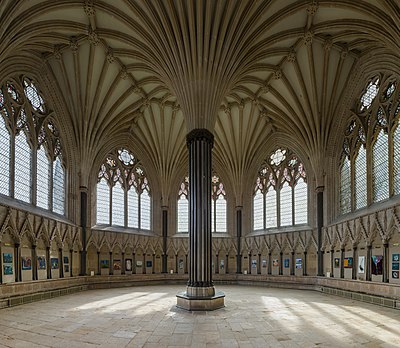
|
Wells Cathedral is an Anglican cathedral in Wells, Somerset, commenced around 1175 on the site of a late-Roman mausoleum and an 8th-century abbey church. The cathedral has been described by the historian John Harvey as Europe's first truly Gothic structure, lacking the Romanesque work that survives in many other cathedrals. It is the seat of the bishop of Bath and Wells. This photograph depicts the interior of Wells Cathedral's chapter house, built by unknown architects between 1275 and 1310 in the Geometric style of Decorated Gothic architecture. Photograph credit: David Iliff
Recently featured:
|
February 18
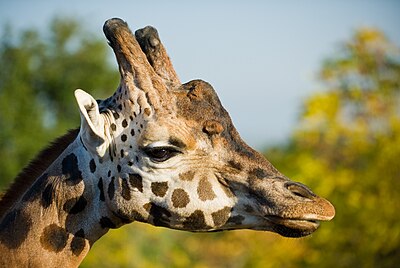
|
The northern giraffe (Giraffa camelopardalis) is native to North Africa. The northern giraffe has two horn-like protuberances known as ossicones on their foreheads. These are longer and larger than those of the southern giraffes, although bull northern giraffes have a third cylindrical ossicone in the center of the head just above the eyes which range in length between 3 inches (8 cm) and 5 inches (10 cm). This individual was photographed at Zoo d'Amnéville in northeastern France. Photograph credit: Stefan Krause
Recently featured:
|
February 19

|
Django Reinhardt (1910–1953) was a Belgian-born Romani-French jazz guitarist and composer. He was one of the first major jazz talents to emerge in Europe, and has been hailed as one of its most significant exponents. This photograph of Reinhardt was taken in the jazz club Aquarium in New York around November 1946. Photograph credit: William P. Gottlieb; restored by Adam Cuerden
Recently featured:
|
February 20

|
|
The Indus River is a 3,180-kilometre (1,980 mi) transboundary and trans-Himalayan river that rises in western Tibet before flowing northwest through the regions of Ladakh and Gilgit-Baltistan in Kashmir. The river then bends sharply to the left after the Nanga Parbat massif, flows generally southwest through Pakistan, and empties into the Arabian Sea near the port city of Karachi. The Indus has a total drainage-basin area exceeding 1,165,000 km2 (450,000 sq mi). Its estimated annual flow is around 243 km3 (58 cu mi), making it one of the fifty largest rivers in the world by discharge. This photograph shows the Indus valley near the city of Leh, a capital of Ladakh in Indian-administered Kashmir. Photograph credit: KennyOMG
Recently featured:
|
February 21

|
The Birth of the Milky Way, also known as The Origin of the Milky Way, is an oil-on-canvas painting by the Flemish artist Peter Paul Rubens, produced between 1636 and 1638 and featuring the Greco-Roman myth of the origin of the Milky Way. The painting depicts Hera (Juno), spilling her breast milk, the infant Heracles (Hercules) and Zeus (Jupiter) in the background. Hera/Juno's face is modelled on Rubens's wife, Hélène Fourment. The carriage is pulled by peacocks, a bird which the ancient Greeks and Romans considered sacred to the goddess. The painting was a part of the commission from Philip IV of Spain to decorate Torre de la Parada. It is now held at the Museo del Prado in Madrid. Painting credit: Peter Paul Rubens
Recently featured:
|
February 22

|
Severe acute respiratory syndrome coronavirus 2 (SARS-CoV-2) is a strain of coronavirus that causes COVID-19, the respiratory disease responsible for the ongoing COVID-19 pandemic. This scanning electron micrograph shows SARS-CoV-2 virions (gold) emerging from the surface of cells cultured in a laboratory. The virus particles depicted were isolated from a patient in the United States. Photograph credit: National Institute of Allergy and Infectious Diseases
Recently featured:
|
February 23
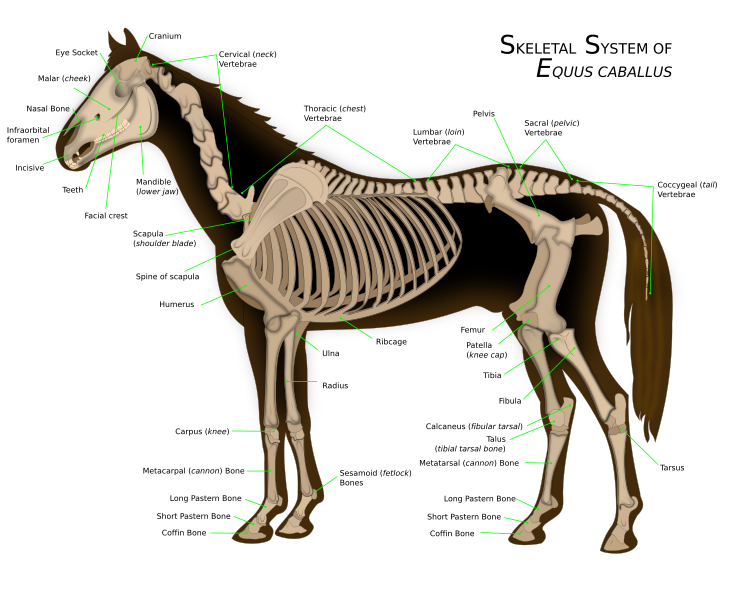
|
|
The horse is a domesticated hoofed animal belonging to the subspecies Equus ferus caballus, part of the odd-toed ungulate order of mammals. Having been domesticated since at least 4000 to 3500 BC, horses now interact with humans in a wide variety of sporting competitions and non-competitive recreational pursuits, as well as in working activities such as police work, agriculture, entertainment, and therapy. Horses were historically used in warfare. This picture shows a diagram of the skeletal system of the horse, which has an average of 205 bones. A significant difference between the horse skeleton and that of a human is the lack of a collarbone – the horse's forelimbs are attached to the spinal column by a powerful set of muscles, tendons, and ligaments that attach the shoulder blade to the torso. The horse's leg bones are also proportioned differently from those of a human. The lower leg bones of a horse correspond to the bones of the human hand or foot. A horse has no muscles in its legs below the knees and hocks, only skin, hair, bone, tendons, ligaments, cartilage, and the assorted specialized tissues that make up the hoof. Diagram credit: Wilfredo Rodríguez
Recently featured:
|
February 24
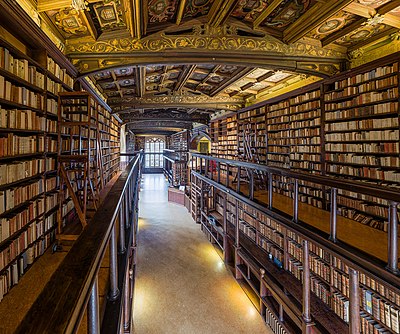
|
Humphrey, Duke of Gloucester (1390–1447), was an English prince, soldier, and literary patron. He was a benefactor and protector of the University of Oxford, donating more than 280 manuscripts, and his name lives on in Duke Humfrey's Library, part of the university's Bodleian Library, the interior of which is shown in this photograph. The possession of such a library did much to stimulate new learning. Photograph credit: David Iliff
Recently featured:
|
February 25

|
|
Christ's Entry Into Brussels in 1889 is an 1888 oil-on-canvas painting by the Belgian artist James Ensor. The work, satirising Jesus's triumphal entry into Jerusalem celebrated on Palm Sunday, is considered Ensor's most famous composition and a precursor to Expressionism. The picture is in the collection of the Getty Center in Los Angeles, California. Painting credit: James Ensor
Recently featured:
|
February 26

|
The Moscow Metro is a rapid-transit system serving Moscow, the capital of Russia, and the neighbouring cities of Krasnogorsk, Reutov, Lyubertsy and Kotelniki in Moscow Oblast. Opened in 1935, it was the first underground railway system in the Soviet Union. This photograph shows the central hall of Elektrozavodskaya, a station on the Arbatsko–Pokrovskaya line. The station was built as part of the third stage of the Moscow Metro and opened in 1944, and is known for its architectural decoration, including rows of inset electric lights on the ceiling and marble bas-reliefs on the walls. Photograph credit: Alexander Savin
Recently featured:
|
February 27

|
Phyllidia elegans is a species of sea slug, a nudibranch in the family Phyllidiidae. It occurs in shallow water in the Red Sea and the tropical Indo-Pacific region. Photograph credit: Rickard Zerpe
Recently featured:
|
February 28
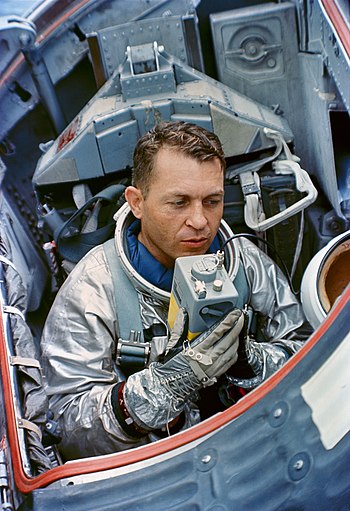
|
Elliot See (July 23, 1927 – February 28, 1966) was an American engineer, United States Naval Aviator, test pilot, and NASA astronaut. Selected as part of NASA Astronaut Group 2 in 1962, See was the prime command pilot for what would have been his first space flight, Gemini 9. He was killed in 1966, along with his Gemini 9 crewmate Charles Bassett, when their jet aircraft crashed at the McDonnell Aircraft plant in St. Louis, where they were about to undergo two weeks of space-rendezvous simulator training. This photograph depicts See participating in water-egress training in 1965 as a backup crew member for Gemini 5. Photograph credit: NASA
Recently featured:
|
Picture of the day archives and future dates

